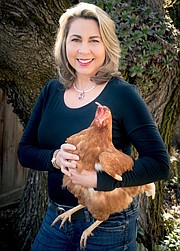Prevent Herbicide Carryover from Mulch and Compost
Adding a layer of compost or mulch around your garden’s vegetables and flowers is one of the best ways to improve soil structure, increase fertility, retain moisture and prevent weeds.
Adding compost, which can be anything from decomposed kitchen scraps and lawn clippings to livestock manure, will add an abundance of organic matter to the soil. Compost is a rich food source for the millions of microbes that live in your soil, and as these microbes break down the material, they in turn create nutrients necessary for plants to thrive.
Mulch, such as grass clippings, straw and hay, can also add fertility to the soil as it decomposes, but it is often used to moderate soil temperature, retain soil moisture and deter weeds. Both materials are important amendments for healthy soil and a healthy garden.
Unfortunately, both compost and mulching materials may contain toxic herbicides that can contaminate the garden soil and severely damage plants growing in the soil. These herbicides can be found in livestock manure, bulk commercial compost, hay, straw, or grass clippings. When applied to the soil surface or mixed into the soil, the herbicides can leach into the soil.
Many farmers and ranchers apply a class of broadleaf herbicides known as pyridine carboxylic acids to pastures, hay, and grain crops to prevent weeds; specifically for toxic weeds that will sicken or kill livestock when ingested by the animals as grass or hay.
These herbicides can be safely consumed by livestock and they will pass through the animal’s digestive tract, being excreted in urine and manure. Unfortunately, the herbicides can remain active in composted manure, hay, straw, and grass clippings for up to five years.
Herbicide carryover into the garden through compost or mulch is serious as it causes poor seed germination and deformed plant growth. Gardeners will often see plant stems and leaves that are twisted, cupped, or elongated. Other symptoms include a quick plant die-off after germination, or if the plant survives, misshapen fruit and reduced yields.
The best way to prevent herbicide carryover is to know your source for compost, manure, or mulching materials. Before you purchase bulk compost from a garden center, ask where the material came from. If you acquire composted or fresh manure, ask what the animals were fed and what, if any, herbicides were used on the hay or pasture.
Likewise, do not use any grass clippings that have been treated with a “weed-and-feed” product, and avoid using certified weed-free straw for garden mulch.
If information about the herbicide content of compost, manure, or mulch is unknown, it’s best to avoid using the material in your garden. Gardeners can also conduct a simple growth test for herbicide contamination before applying compost of unknown origin.
Pea and bean plants are very sensitive to broadleaf herbicides and can serve as a bellwether for toxins. Mix a combination of the manure or compost with a quality commercial growing medium in a 2:1 ratio. Fill three pots with this mix and plant two bean or pea seeds in each. Then fill three additional pots using only the commercial growing mix – this will be the control group of pots – and plant two bean or pea seeds in each pot.
Allow the plants to grow for two to three weeks until the first true leaves appear and plants become established. Compare the growth of the control group with the test group. If you see abnormal growth, or plants that die off quickly, you can assume the compost material is contaminated. If all plants grow normally, then the compost is likely safe to use.
Gardeners invest time and money into their growing efforts, so don’t let a bad batch of compost or “free” manure sideline your garden. Ask questions about the amendments that you are applying to keep your garden growing strong and healthy. For more information about reclaiming contaminated garden soil, contact the University of Idaho Extension, Kootenai County Idaho Master Gardeners.
Candace Godwin is a Certified Idaho Master Gardener. The University of Idaho Extension, Kootenai County Idaho Master Gardener program is located in the UI Research Park, 958 S. Lochsa St., in Post Falls. Learn more about us at https://www.uidaho.edu/extension/county/kootenai/garden or on Facebook. Visit us in person, email us at kootenaimg@uidaho.edu, or call us at 208-292-2525. IMG services are free to the public.







